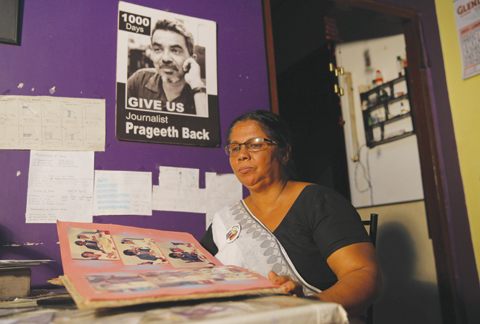Dozens of journalist remain dead, missing after civil war
 HOMAGAMA: In this Monday, Jan 23, 2017 photo, Sandya Ekneligoda, wife of disappeared journalist Prageeth Ekneligoda, turns pages of their wedding album while speaking to the Associated Press at her residence. — AP
HOMAGAMA: In this Monday, Jan 23, 2017 photo, Sandya Ekneligoda, wife of disappeared journalist Prageeth Ekneligoda, turns pages of their wedding album while speaking to the Associated Press at her residence. — APCOLOMBO: Hope is fading fast that Sri Lanka's government will take action against those responsible for the deaths and disappearances of dozens of journalists during and after the country's long civil war, activists and relatives said yesterday. President Maithripala Sirisena campaigned on a promise of ending a culture of impunity when he defeated former President Mahinda Rajapaksa in a January 2015 election.
During Rajapaksa's nine-year tenure, dozens of journalists were killed, abducted and tortured, or fled the country fearing for their lives. Scores more were killed or disappeared during the civil war that ended in 2009 with the defeat of Tamil Tiger rebels. Two years into Sirisena's presidency, there is little sign that the suspects, mostly military soldiers, will be punished.
Yesterday, dozens of journalists and activists gathered in Colombo to commemorate the missing and write postcards to Sirisena demanding that he appoint a presidential commission to investigate the abductions. The campaign was organized to mark what organizers call "Black January," a commemoration of the killings and abductions of journalists and the destruction of television studios that occurred in the month of January between 2005 and 2010.
Corruption, nepotism
Among those participating was Sandya Ekneligoda, who has fought for seven years to discover what happened to her abducted husband, Prageeth Ekneligoda. Prageeth, a journalist and cartoonist, wrote about corruption, nepotism and Rajapaksa's leadership of the military campaign against the rebels. He was abducted two days before a 2010 presidential election in which he actively supported Rajapaksa's rival.
Ekneligoda said the Sirisena government brought hope for justice, but its recent steps have dented her confidence. One reason, she said, was a speech by Sirisena in which he criticized police for holding the soldiers suspected in Prageeth's abduction longer than necessary. Days after the speech, a court released the suspects on bail and the military promptly reinstated them to their earlier positions, which Ekneligoda said was a clear message that the suspects have the state's backing.
"Clearly the manner of the president today is not what we saw when we brought him into power in 2015. He has a totally different attitude," she told The Associated Press. Sirisena has said his speech was not meant to influence the court. During the country's 26-year civil war, both the government and the Tamil Tiger rebels were accused of killing and abducting critics. The government's war victory in 2009 ended the rebels' campaign for an independent state for ethnic minority Tamils. - AP









